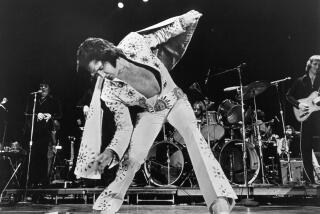The Resurrection of Johnny Powers
- Share via
It’s easy when reading about Sun Records to think that everyone who stepped to a microphone in that legendary Memphis studio in the ‘50s and early ‘60s became a star.
After all, the list of singers who did exactly that include Elvis Presley, Jerry Lee Lewis, Johnny Cash, Roy Orbison, Charlie Rich and Carl Perkins.
But there were dozens of other young singers who passed through Sam Phillips’ Sun Studios without becoming celebrated parts of rock history--forgotten names like . . . Johnny Powers.
One of the few non-Southerners to record for Sun, Powers was a Michigan native who only released one single on Sun--a 1959 record featuring “With Your Love, With Your Kiss” on one side and “Be Mine, All Mine” on the other--before returning to the Midwest and, for all practical purposes, fading from sight.
But “Long Blond Hair” gives him another moment in the pop sun, so to speak. A 23-song retrospective of Powers’ music from the late ‘50s, the album was recently released by Norton Records, a small New York firm specializing in ‘50s-style rock.
Powers--whose real name is John Pavlik--started out in country music, playing guitar in a band and sometimes taking over lead vocals on a Webb Pierce or Sonny James song, according to the album’s liner notes. Then one day, someone put a record on the turntable and told him, “Man, you gotta hear this guy Elvis!”
The record was “Milk Cow Blues,” one of the singles Presley made for Sun before moving to RCA and becoming a national teen idol, and Powers’ goal became making music like Elvis and going to Sun Records.
His dream came true in 1959 when Phillips liked one of Powers’ demo tapes and invited the young singer to Memphis to record some songs, backed by a band that included Charlie Rich on piano. The “With Your Love” single is included on the Norton album, along with a few outtakes from the Sun session.
But “Long Blond Hair” is built mostly around the records that Powers made for small regional labels in the Midwest--records that show him moving from the exuberance of Eddie Cochran in the title track to the bluesy energy of Carl Perkins in “Rock Rock” on to the Presley-esque feel of “Mama Rock.”
The music is upbeat and inviting--good enough in moments to have been a hit, but there was lots of competition in the rockabilly genre at the time.
Powers--who produced “Psycho,” Jack Kittel’s classic 1974 novelty--continues in the music business as a performer and the head of a production company.
“But,” as the liner notes conclude, “it’s on these 1957-59 sides that a wiry kid from Detroit with a voice as big as Lake Superior truly made his wildest mark.”
More to Read
The biggest entertainment stories
Get our big stories about Hollywood, film, television, music, arts, culture and more right in your inbox as soon as they publish.
You may occasionally receive promotional content from the Los Angeles Times.










